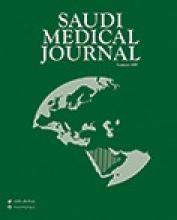Research ArticleOriginal Article
Open Access
Effects of personality traits on collaborative performance in problem-based learning tutorials
Hye Won Jang and Seung Won Park
Saudi Medical Journal December 2016, 37 (12) 1365-1371; DOI: https://doi.org/10.15537/smj.2016.12.15708
Hye Won Jang
From the Department of Medical Education, School of Medicine, Sungkyunkwan University, Seoul, South Korea
MD, PhDSeung Won Park
From the Department of Medical Education, School of Medicine, Sungkyunkwan University, Seoul, South Korea
PhD
References
- ↵
- Lestari E,
- Stalmeijer RE,
- Widyandana D,
- Scherpbier A
- ↵
- Olupeliyawa A,
- Balasooriya CD,
- Hughes C,
- O’Sullivan AJ
- ↵
- Singh H,
- Thomas EJ,
- Petersen LA,
- Studdert DM
- ↵
- Cameron A,
- Millar J,
- Szmidt N,
- Hanlon K,
- Cleland J
- ↵
- Barrows HS,
- Tamblyn RM
- ↵
- Walker A,
- Leary H,
- Hmelo-Silver CE,
- Ertmer PA
- Savery JR,
- Overview of problem-based learning: Definitions and distinctions
- ↵
- Ju H,
- Choi I,
- Rhee BD,
- Tae-Lee J
- ↵
- ↵
- ↵
- ↵
- Schüttpelz-Brauns K,
- Obertacke U,
- Kaden J,
- Hagl CI
- ↵
- ↵
- Hulsman RL,
- Peters JF,
- Fabriek M
- ↵
- Cloninger CR,
- Svrakic DM,
- Przybeck TR
- ↵
- ↵
- Ham B-J,
- Lee Y-M,
- Kim M-K,
- Lee J,
- Ahn D-S,
- Choi M-J,
- et al.
- ↵
- Min BB,
- Oh HS,
- Lee JY
- ↵
- Lee SH,
- Hwang ST
- ↵
- Eva KW
- ↵
- Sluijsmans D,
- Moerkerke G,
- Van Merrienboer J,
- Dochy FJ
- ↵
- ↵
- De Wever B,
- Van Keer H,
- Schellens T,
- Valcke M
- ↵
- Peralta CF,
- Lopes PN,
- Gilson LL,
- Lourenço PR,
- Pais L
- ↵
- Daspit J,
- Justice Tillman C,
- Boyd NG,
- Mckee V
- ↵
- Farmer RF,
- Goldberg LR
- ↵
- Frambach JM,
- Driessen EW,
- Beh P,
- van der Vleuten CP
- ↵
- Kubota R
- ↵
In this issue
Effects of personality traits on collaborative performance in problem-based learning tutorials
Hye Won Jang, Seung Won Park
Saudi Medical Journal Dec 2016, 37 (12) 1365-1371; DOI: 10.15537/smj.2016.12.15708
Jump to section
Related Articles
- No related articles found.





